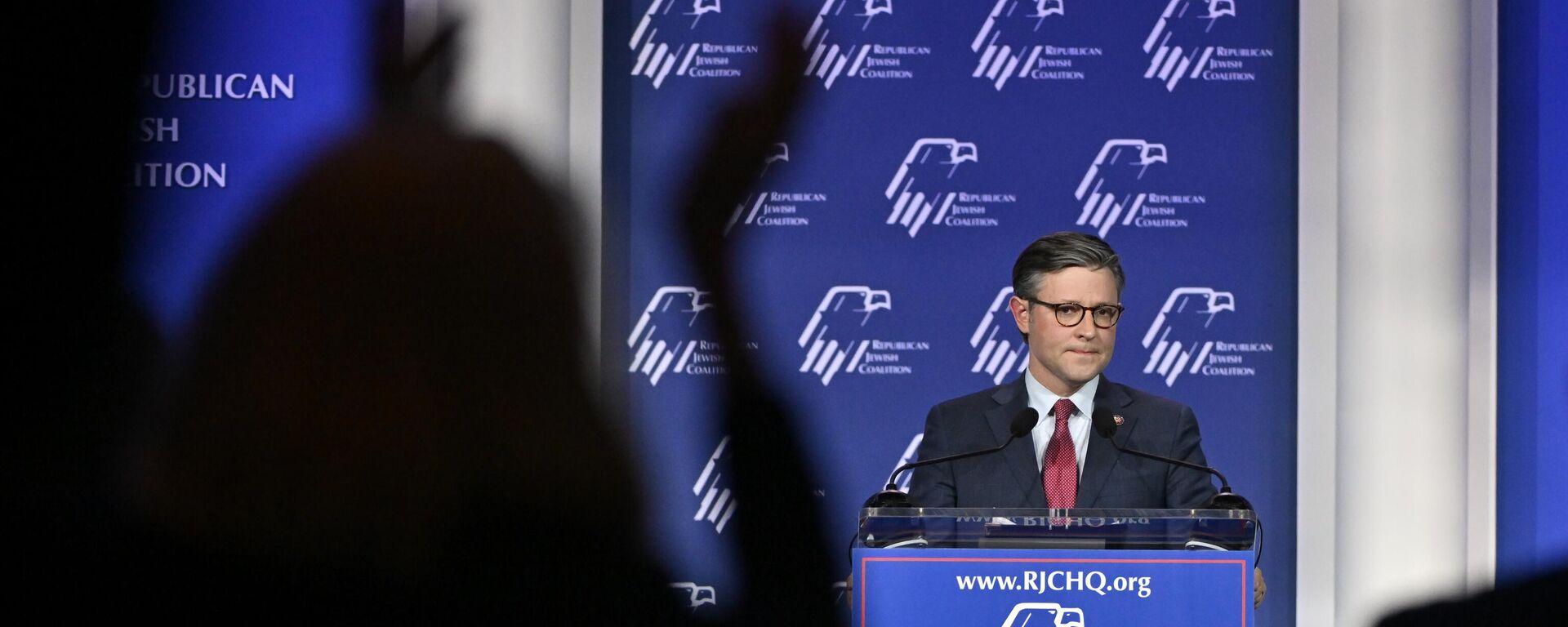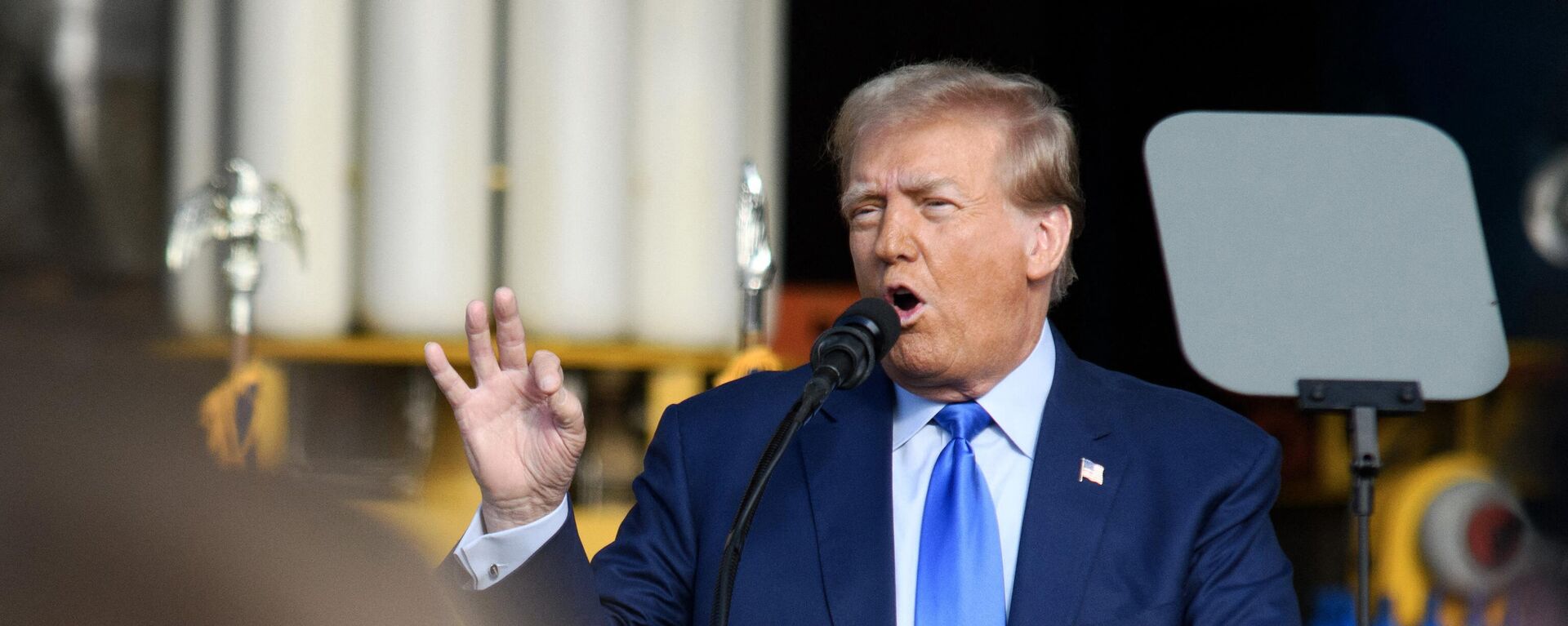https://sputnikglobe.com/20240116/champagne-corks-popping-in-moscow-as-us-global-influence-wanes-1116186388.html
‘Champagne Corks Popping in Moscow’ as US Global Influence Wanes
‘Champagne Corks Popping in Moscow’ as US Global Influence Wanes
Sputnik International
In the waning days of the Cold War US Secretary of State James Baker made a solemn vow to Mikhail Gorbachev that NATO would not expand “one inch eastward” beyond a reunited Germany, a promise that was broken in just nine years. Now Russian leaders feel vindicated as the rest of the world is waking up to the increasingly capricious and self-serving nature of 21st-century US foreign policy.
2024-01-16T00:19+0000
2024-01-16T00:19+0000
2024-01-16T08:49+0000
us
russia
russian economy under sanctions
donald trump
ukraine
ukraine crisis
ukrainian conflict
ukrainian crisis
world
us arms for ukraine
https://cdn1.img.sputnikglobe.com/img/07e7/07/0b/1111811947_0:338:451:592_1920x0_80_0_0_252a1b0d8c80143f670f86476161809a.png
In the waning days of the Cold War US Secretary of State James Baker made a solemn vow to Mikhail Gorbachev that NATO would not expand “one inch eastward” beyond a reunited Germany, a promise that was broken in just nine years. Now Russian leaders feel vindicated as the rest of the world is waking up to the increasingly capricious and self-serving nature of 21st-century US foreign policy.“When the United States’ voice is not as strong, is not as balanced, is not as fair as it should be, then a problem is created for the world,” said Ronald Sanders, the ambassador from Antigua and Barbuda to the United States.Many of the most urgent pleas came from European envoys whose countries have long relied on the US for guidance on foreign affairs. The instinctual trust in America for steady leadership led Western countries to sign on to US-led sanctions against Russia in 2022 without hesitation, a move which has had harsh economic consequences in Germany and elsewhere. Now leaders are left wondering if US instability will further exacerbate the sacrifice they’ve made.Domestic American politics has become increasingly fractious in recent decades – what was an almost unthinkable threat of a government shutdown in the 1990s has become a nearly perfunctory aspect of budget negotiations under divided government. But now the political dysfunction imperils foreign policy as well.Envoys were reportedly dismayed when US lawmakers injected a contentious debate over border security into discussions of assistance for Ukraine and Israel – such aid would’ve sailed through Congress unanimously in years past. The unprecedented battle over the House speakership last year also rankled observers, with the country’s legislature paralyzed by partisanship as Hamas’ attack on Israel provoked a major conflict.The unexpected politicization of Ukraine assistance has led supporters to devise creative new arguments to sell it to GOP lawmakers – demonstrated last year when an ad campaign by neoconservative commentator Bill Kristol urged backing for Kiev as a way to undermine China. But the prospect for continued aid seems shaky at best as analysts say the Zelensky regime is highly unlikely to reverse its fortunes on the battlefield.The prospect of former President Donald Trump returning to the White House next year was cited by some envoys as threatening continued instability and damage to America’s reputation as a “pillar of democracy and global stability.” On Monday a video went viral on the X social media platform of a Trump supporter welcoming the prospect the controversial billionaire would institute a “dictatorship.”But most figures cited “structural forces” encouraging the trend regardless of who wins the presidency in November.The decline of the United States has created an opening for other countries to intervene in diplomatic affairs typically seen as the domain of great powers, as when China negotiated an historic agreement between Iran and Saudi Arabia recently. The successful mediation stands in contrast to the US’ abandonment of its Iran nuclear deal, which was cited by one figure as an example of America’s duplicitousness.The BRICS economic bloc also seems poised to continue to grow in influence in the coming years, especially as countries abandon their use of the US dollar in light of its weaponization through coercive sanctions.Recently Russian President Vladimir Putin commented on the continued military confrontation between Israel and Hamas, saying the outbreak of hostilities there demonstrated the failure of a US-led world order to ensure peace and stability. Increasingly it appears other world leaders are coming around to the Russian position on the matter.
https://sputnikglobe.com/20231205/no-more-aid-for-ukraine-under-new-us-house-speaker-1115408809.html
https://sputnikglobe.com/20231206/trump-says-hed-act-as-dictator-on-first-day-of-his-second-term-if-reelected-in-2024-1115437389.html
russia
ukraine
Sputnik International
feedback@sputniknews.com
+74956456601
MIA „Rossiya Segodnya“
2024
Sputnik International
feedback@sputniknews.com
+74956456601
MIA „Rossiya Segodnya“
News
en_EN
Sputnik International
feedback@sputniknews.com
+74956456601
MIA „Rossiya Segodnya“
Sputnik International
feedback@sputniknews.com
+74956456601
MIA „Rossiya Segodnya“
cold war, donald trump, ukraine crisis, ukrainian conflict, us hegemony, us military presence, us bases, us military, us control, us dominance, us domination, american power, us hegemony, unipolar world, multipolar world, polycentric world, american sanctions, deterrence, us arms for ukraine, us assistance to ukraine, aid allocations for ukraine, ukraine aid, money for ukraine, us for ukraine, us weapons for ukraine, us aid to ukraine, us funding for ukraine, us funding to ukraine
cold war, donald trump, ukraine crisis, ukrainian conflict, us hegemony, us military presence, us bases, us military, us control, us dominance, us domination, american power, us hegemony, unipolar world, multipolar world, polycentric world, american sanctions, deterrence, us arms for ukraine, us assistance to ukraine, aid allocations for ukraine, ukraine aid, money for ukraine, us for ukraine, us weapons for ukraine, us aid to ukraine, us funding for ukraine, us funding to ukraine
‘Champagne Corks Popping in Moscow’ as US Global Influence Wanes
00:19 GMT 16.01.2024 (Updated: 08:49 GMT 16.01.2024) Domestic political instability is threatening America’s ability to project power and shape the world order.
In the waning days of the Cold War US Secretary of State James Baker
made a solemn vow to Mikhail Gorbachev that NATO would not expand “one inch eastward” beyond a reunited Germany, a promise that was broken in just nine years. Now Russian leaders feel vindicated as the rest of the world is waking up to the increasingly capricious and self-serving nature of 21st-century US foreign policy.
“I can hear those champagne bottle corks popping in Moscow – like it’s Christmas every f***ing day,” said one European ambassador to a US news outlet. The envoy was one of a dozen current and former diplomats who
spoke with the website to discuss how political crisis in the United States is endangering the country’s long standing role as a leader in international affairs. Many of them spoke anonymously in order to discuss the sensitive matter with full candidness.
“When the United States’ voice is not as strong, is not as balanced, is not as fair as it should be, then a problem is created for the world,” said Ronald Sanders, the ambassador from Antigua and Barbuda to the United States.
Many of the most urgent pleas came from European envoys whose countries have long relied on the US for guidance on foreign affairs. The instinctual trust in America for steady leadership led Western countries to sign on to US-led sanctions against Russia in 2022
without hesitation, a move which has had harsh economic
consequences in Germany and elsewhere. Now leaders are left wondering if US instability will further exacerbate the sacrifice they’ve made.
Domestic American politics has become increasingly fractious in recent decades – what was an almost unthinkable threat of a government shutdown in the 1990s has become a nearly perfunctory aspect of budget negotiations under divided government. But now the political dysfunction imperils foreign policy as well.
Envoys were reportedly dismayed when US lawmakers injected a contentious debate over border security into discussions of assistance for Ukraine and Israel – such aid would’ve sailed through Congress unanimously in years past. The unprecedented battle over the House speakership last year also rankled observers, with the country’s legislature paralyzed by partisanship as
Hamas’ attack on Israel provoked a major conflict.

5 December 2023, 17:29 GMT
The unexpected politicization of Ukraine assistance has led supporters to devise creative new arguments to sell it to GOP lawmakers – demonstrated last year when an ad campaign by neoconservative commentator Bill Kristol
urged backing for Kiev as a way to undermine China. But the prospect for continued aid seems shaky at best as analysts say the Zelensky regime is highly unlikely to reverse its fortunes on the battlefield.
The prospect of former President Donald Trump returning to the White House next year was cited by some envoys as threatening continued instability and damage to America’s reputation as a “pillar of democracy and global stability.” On Monday a
video went viral on the X social media platform of a Trump supporter welcoming the prospect the controversial billionaire would institute a “dictatorship.”

6 December 2023, 22:16 GMT
But most figures cited “structural forces” encouraging the trend regardless of who wins the presidency in November.
The decline of the United States has created an opening for other countries to intervene in diplomatic affairs typically seen as the domain of great powers, as when China negotiated an historic agreement between Iran and Saudi Arabia recently. The successful mediation stands in contrast to the US’ abandonment of its Iran nuclear deal, which was cited by one figure as an example of America’s duplicitousness.
The BRICS economic bloc also seems poised to continue to grow in influence in the coming years, especially as countries abandon their use of the US dollar in light of its weaponization through coercive sanctions.
Recently Russian President Vladimir Putin commented on the continued military confrontation between Israel and Hamas, saying the outbreak of hostilities there demonstrated the failure of a US-led world order to ensure peace and stability. Increasingly it appears other world leaders are coming around to the Russian position on the matter.




